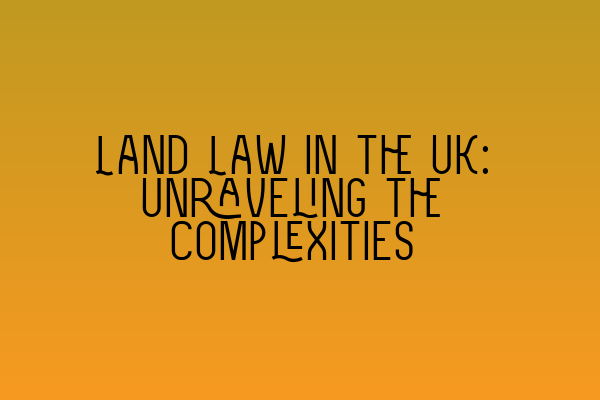Land Law in the UK: Unraveling the Complexities
Welcome to SQE Property Law & Land Law, where we specialize in providing expert legal advice and services in the field of land law in the UK. In today’s blog post, we will be delving into the complexities of land law, exploring its various aspects, and shedding light on key concepts that every property owner and aspiring legal professional should be familiar with.
1. Introduction to Land Law
Land law in the UK encompasses a wide range of legal principles and regulations that govern the ownership, use, and transfer of land. It is a complex area of law that requires a deep understanding of statutes, case law, and legal doctrines. Whether you are a property owner, an aspiring lawyer, or a student preparing for the SQE exams, having a clear grasp of land law is essential.
2. Ownership and Tenure
One of the fundamental concepts in land law is ownership and tenure. In the UK, land can be held through different types of tenure, including freehold, leasehold, and commonhold. Each type carries its own set of rights and responsibilities. Freehold ownership gives the owner absolute title to the land, whereas leasehold ownership grants the owner a lease for a specified duration. Commonhold, on the other hand, refers to the joint ownership of a property within a larger development.
3. Registered and Unregistered Land
In the UK, land can be registered or unregistered. Registered land is recorded in the Land Registry, which provides a centralized database of all registered properties. Registering land offers significant advantages, as it provides certainty of ownership, facilitates the transfer of property, and enables the establishment of legal charges or restrictions. Unregistered land, however, requires a different set of legal procedures to establish ownership and deal with property transactions.
4. Easements and Restrictive Covenants
Easements and restrictive covenants are important legal concepts that affect how land can be used and enjoyed. An easement is a right granted to someone to use another person’s land for a specific purpose, such as a right of way or a right to access utilities. Restrictive covenants, on the other hand, are agreements that restrict how land can be used or developed. They are often found in title deeds and can be enforceable against subsequent owners.
5. Adverse Possession
Adverse possession refers to the acquisition of someone else’s land through continuous possession without the owner’s consent. To claim adverse possession, the possessor must satisfy certain requirements, such as occupying the land for a specified number of years and demonstrating an intention to possess the land. Adverse possession can be a complex legal issue, often involving disputes and legal challenges.
6. Leasehold Enfranchisement
Leasehold enfranchisement grants leaseholders the right to collectively purchase the freehold of their property or extend their lease. This is particularly relevant for leasehold properties with dwindling lease terms. Leasehold enfranchisement provides leaseholders with greater control over their property, the ability to manage their own affairs, and the potential to enhance the value of their investment.
7. Landlord and Tenant Law
One of the key areas within land law is landlord and tenant law. This branch of law regulates the rights and obligations of landlords and tenants in residential and commercial properties. It covers aspects such as the granting and termination of leases, rent payment, repairs and maintenance, and dispute resolution. Understanding landlord and tenant law is crucial for both landlords and tenants to ensure compliance with legal requirements and protect their interests.
Conclusion
Land law in the UK is a complex and multifaceted area of law that encompasses various principles and regulations. Whether you are a property owner, a legal professional, or a student preparing for the SQE exams, having a solid understanding of land law is essential. At SQE Property Law & Land Law, we are dedicated to providing expert advice and practical solutions to help you navigate the complexities of land law. Contact us today to learn more about our services and how we can assist you.
Related Articles:
– SQE 1 Practice Exam Questions
– SQE 1 Practice Mocks FLK1 FLK2
– SQE 2 Preparation Courses
– SQE 1 Preparation Courses
– SRA SQE Exam Dates
